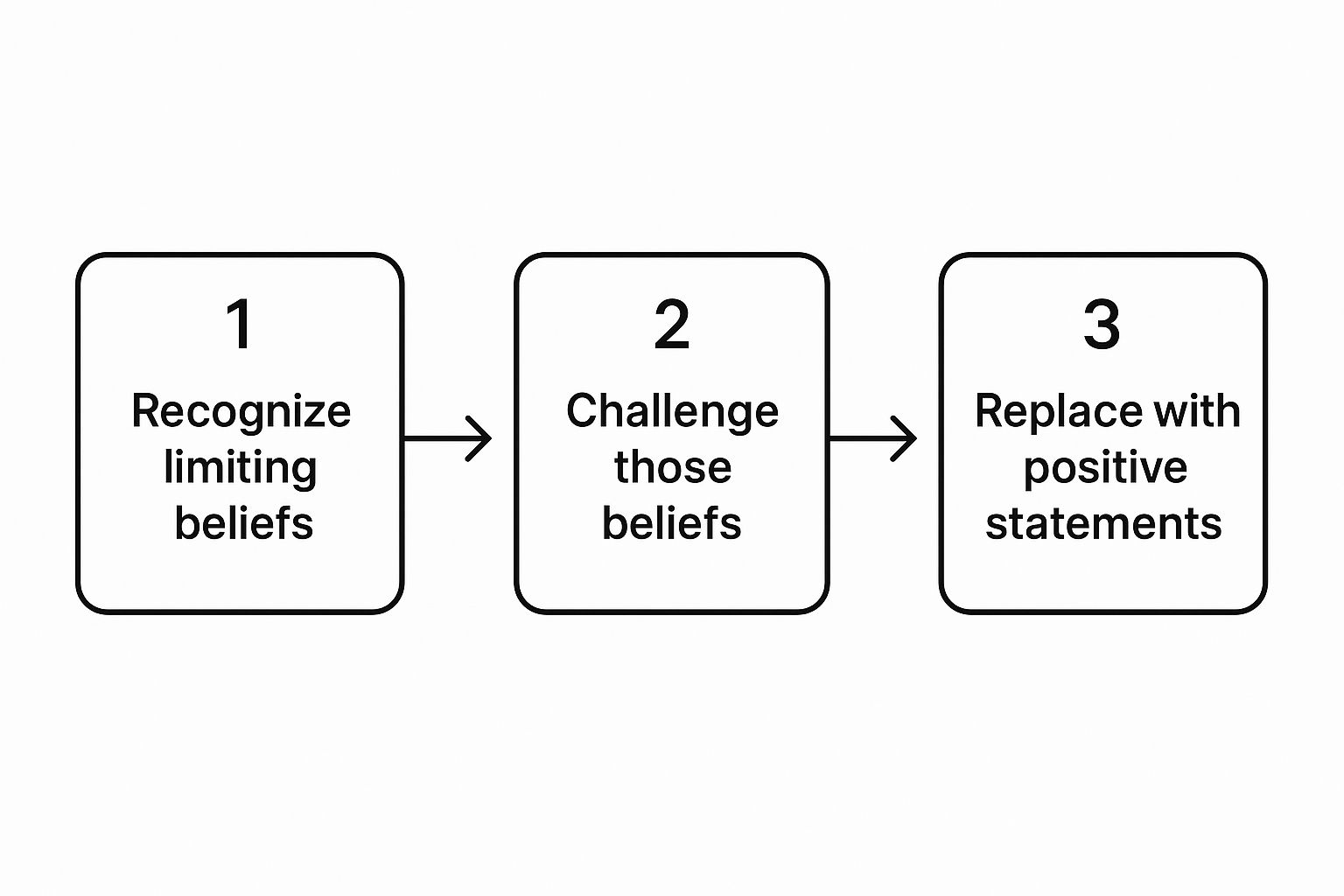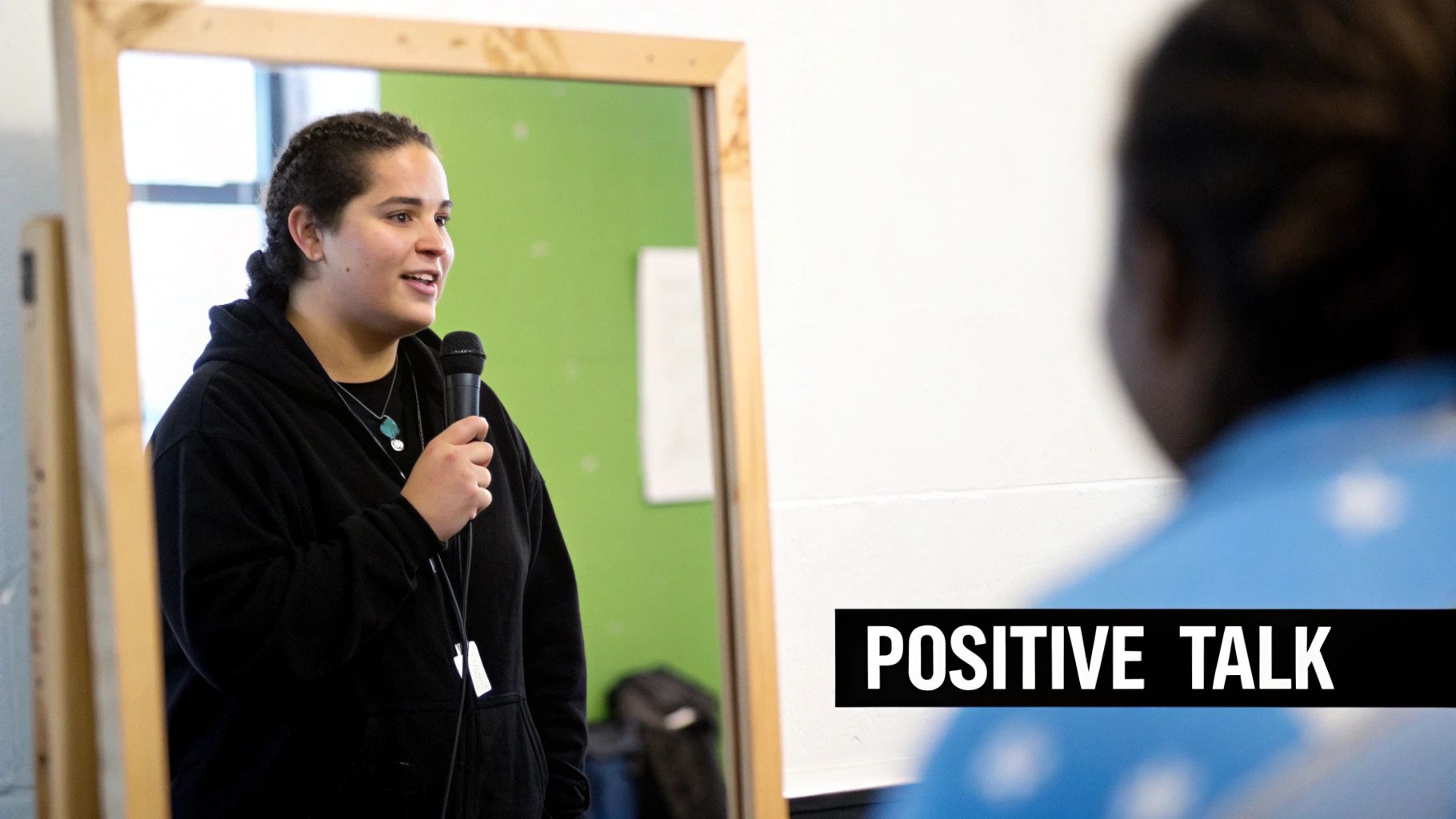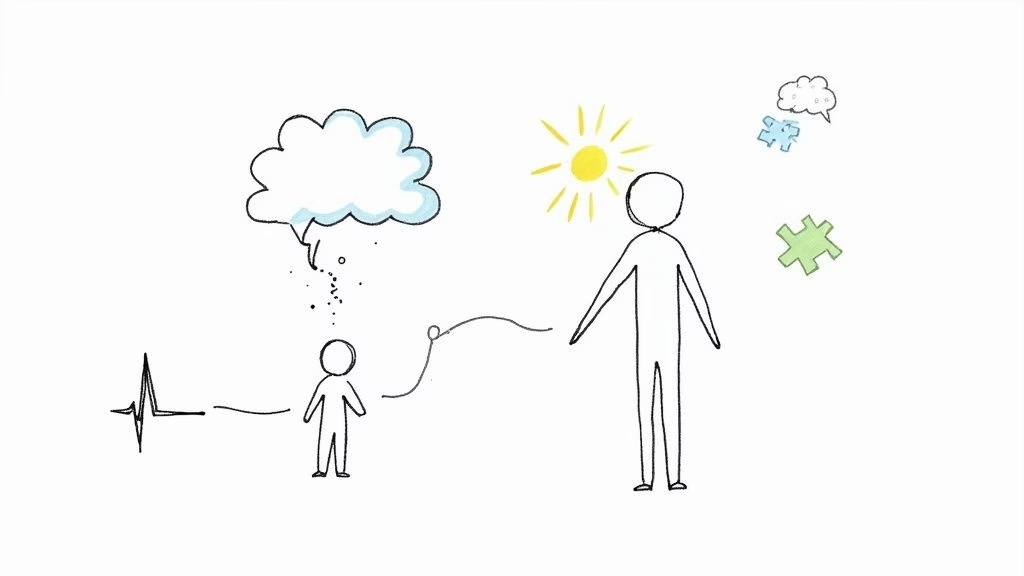Forget the “fake it ’til you make it” advice. Real confidence isn’t something you pretend to have—it’s something you earn with yourself, one small, consistent action at a time. It’s a skill you build, piece by piece, not a personality trait you’re born with.
Understanding the Real Source of Confidence
True confidence isn’t about being the loudest person in the room or never feeling a shred of doubt. It’s much quieter than that. It’s an internal trust in your ability to handle whatever comes your way—the good, the bad, and the unexpected. It’s knowing you can navigate challenges, learn from your mistakes, and keep moving forward.
This quiet trust is shaped by a few key things: your past experiences, the feedback you get from others, and most importantly, that voice inside your own head. Often, a lack of confidence comes from giving way too much power to your inner critic or fearing failure so much that you avoid trying in the first place. This cycle of procrastination and self-doubt can feel overwhelming, especially with the pressures of school and life piling up.
The good news? You can absolutely break this cycle.
Where did my Confidence come from
My confidence came from stepping outside my comfort zone. Climbing and surfing were the mediums through which I explored that space. I believe how we do anything is how we do everything. As a teen and young adult, I threw myself into these pursuits with the mindset of a beginner, knowing that the more reps I put in, the better I would become.
To do that, I had to face a lot of fear. Looking back, I wouldn’t be the person I am today without those experiences.
One of my greatest accomplishments—despite feeling completely unconfident—was climbing El Capitan for the first time. I had no idea what to expect or what I had gotten myself into. All I could do was focus on the moment and keep moving upward.
After four days on the wall, we finally reached the summit. That experience was a major turning point in my life and a huge moment of growth.
Shifting from Fear to Action
The first step is a mindset shift. Confidence isn’t a prerequisite for taking action; it’s a byproduct of it. You don’t wait to feel confident to start your homework. You start your homework, and that’s what builds the confidence.
Every time you tackle a small task you’ve been putting off—like finally starting that essay or just organizing your backpack—you send a powerful message to your brain: I am capable. These small wins are the fundamental building blocks of self-trust. They’re your proof.
Confidence is built on accomplishment. If you achieve small and big goals, you’re going to feel much better about yourself. It begins with your day-to-day goals.
The Power of Repetition and Proof
Psychology backs this up. Research shows that repeating a new behavior for a period of 21 to 66 days can make it feel automatic. What starts as a conscious, difficult effort eventually becomes a natural ability. As these actions become second nature, your belief in yourself solidifies. You can find more about the psychology behind this on Ipsos.
This is especially true when you’re dealing with the anxiety that so often walks hand-in-hand with low confidence. By taking small, manageable steps, you slowly retrain your brain’s response to stress. We talk more about this in our guide on practical strategies for how to reduce anxiety.
To give you a roadmap, I’ve broken down the core principles we’ll be working with. Think of this table as your cheat sheet for building genuine self-assurance, starting today.
Core Principles for Building Real Confidence
| Principle | What It Means | Why It Works |
|---|---|---|
| Action Over Feeling | Doing something small instead of waiting until you feel confident. | It creates tangible proof of your capability, which builds belief. |
| Master Small Wins | Focusing on consistently completing tiny, manageable tasks. | This generates momentum and provides a dopamine boost that fuels motivation. |
| Challenge Your Inner Critic | Actively questioning negative thoughts about your own abilities. | It stops the cycle of self-sabotage and helps you build a more supportive mindset. |
| Embrace Imperfection | Accepting that making mistakes is a normal, necessary part of learning. | This reduces the fear of failure, making it easier to take risks and try new things. |
These pillars aren’t just theories; they are actionable strategies that work. By focusing on these principles, you shift from a mindset of doubt to one of evidence-based confidence.
How to Win the Inner Game of Confidence
Your thoughts have a massive impact on how you feel and act. Winning the inner game of confidence really just means learning how to manage your internal monologue—that little voice in your head that can be your biggest cheerleader or your harshest critic. For a lot of teens, this critic gets loudest right before a big exam, a class presentation, or tryouts for a team.
It often starts with a single negative thought: “I’m going to mess this up.” That thought fuels anxiety, which can lead to procrastination or straight-up avoidance. When you back down from the challenge, your brain learns that the only way to get relief is to avoid it, which just reinforces the belief that you aren’t capable. This is how the inner critic gets its power.
Building confidence means breaking that pattern. You don’t have to believe every single thought that pops into your head. Instead, you can learn to observe, challenge, and reframe them.
Master Your Mindset with Cognitive Reframing
Cognitive reframing is a powerful technique for getting a handle on your thoughts. It’s not about pretending the negative doesn’t exist, but about questioning its accuracy and finding a more realistic, helpful perspective. Think of it as turning harsh self-criticism into productive self-coaching.
Let’s take a common scenario: You have a huge history project due, and your first thought is, “There’s no way I can finish this; I’m going to fail.”
Instead of letting that thought paralyze you, you can reframe it:
- Original Thought: “I’m going to fail this project.”
- Challenging Question: “Is that 100% true? Have I failed every project I’ve ever had?”
- Reframed Thought: “This project is overwhelming, but I can start by breaking it into smaller parts. I’ll just begin with the outline.”
This small shift changes everything. It moves you from a state of paralysis to a state of action, which is the secret to building real momentum. The infographic below shows a simple flow for how this works.

This visual really drives home that confidence is an active process of mental management, not just some passive feeling you wait for.
From Small Actions to Big Belief
This all ties into a concept I love called the competence-confidence loop. It’s simple. Taking a small, manageable action builds a tiny bit of skill or competence. That small feeling of competence then fuels just enough confidence to take the next small action. Each step validates your ability and starts to quiet your inner critic.
The key is to stop waiting for confidence to magically appear and start creating it through deliberate action. One small, completed task is far more powerful than hours of worrying about whether you can do it.
When you’re stuck in a cycle of procrastination with schoolwork, motivation feels impossible to find. Use this loop to your advantage. Don’t focus on “finishing the essay.” That’s too big. Focus on “writing one paragraph.” That’s a win. Celebrate it, then move on to the next small goal.
Resources for Teen Mental Health
Managing your inner world is crucial, but you don’t have to do it alone. If negative thoughts feel overwhelming, reaching out is a sign of strength, not weakness.
Organizations like the National Institute of Mental Health (NIMH) provide credible, no-nonsense information on teen mental health. Resources such as The Jed Foundation offer specific support for teens and young adults to build skills and find help when they need it. These tools can give you the backup you need as you learn to build confidence from the inside out.
Beat Procrastination and Find Your Motivation
Procrastination isn’t just laziness—I see it all the time in my coaching practice, and it’s almost always a direct symptom of low confidence. The fear of not doing something perfectly can be so paralyzing that you end up not doing it at all.
This avoidance kicks off a nasty cycle. You put something off, which reinforces your self-doubt, which leads to more stress and even less motivation for school and other responsibilities. It’s a downward spiral.
At its core, this cycle is driven by fear—fear of failure, fear of judgment, or the nagging worry that your best just won’t be good enough. When a big assignment feels overwhelming, your brain naturally seeks relief by pushing it off. But that temporary comfort comes at a huge cost, slowly chipping away at your belief in your own ability to follow through.
The only way to break free is to shift your focus. Stop staring at the massive final product and concentrate on one tiny, manageable first step.

Overcome Inertia With Small Wins
The secret to beating procrastination is to make the starting line so ridiculously easy to cross that you can’t say no. This is where a couple of simple but powerful strategies come into play.
- The Two-Minute Rule: If a task takes less than two minutes, just do it. Right now. For bigger things, like studying for an exam or writing a paper, commit to working on it for just two minutes. Anyone can do something for two minutes. Often, that’s all it takes to get over the initial hump.
- Break It Down: A huge project like “write a history paper” is just plain intimidating. So, break it down into absurdly small tasks. I’m talking “Find one source,” “Write one sentence for the intro,” or even just “Create the document and give it a title.” Each tiny checkmark gives you a real sense of accomplishment.
This approach is so effective because it works with your brain’s reward system, not against it. Every time you complete a small goal, your brain releases a bit of dopamine, the neurotransmitter tied to pleasure and motivation. This creates a positive feedback loop: the small win feels good, which motivates you to take the next small step.
If you want to go deeper on the mechanics behind this, our guide on how to stop procrastinating offers more actionable advice.
Structure Your Success
Building momentum requires a little bit of structure. A vague plan like, “I’ll study this weekend,” is a perfect recipe for procrastination. You need a concrete schedule that feels helpful, not suffocating.
For a teen struggling with motivation, the goal isn’t to create a perfect, rigid schedule. It’s about creating a realistic one that allows for flexibility and celebrates progress over perfection.
Try this: create a simple study calendar, but schedule your breaks and fun activities first. This gives you things to look forward to and prevents that feeling of burnout before you even start. You can also use apps like Todoist or Trello to visually track what you’re doing. There’s something incredibly satisfying about seeing your “To-Do” list shrink and your “Done” list grow. It’s tangible proof that you’re capable and moving forward.
Remember, the goal isn’t to eliminate procrastination forever. That’s not realistic. It’s about learning how to build confidence in your ability to get started, even when you really, really don’t feel like it.
A Parent’s Guide to Supporting Teen Confidence

As a parent or guardian, you play a massive role in shaping how your teen sees themselves. It’s only natural to want to build them up, but I’ve learned from my own experience and from coaching countless teens that how you offer support makes all the difference.
The right approach can foster genuine, lasting confidence—the kind that helps them handle life’s inevitable curveballs. The key is to shift your focus from praising innate talent to celebrating their effort and process. It sounds small, but this one change has a powerful ripple effect on their entire mindset.
Praise Effort, Not Just Talent
It’s tempting to say, “You’re so smart!” when your teen brings home a good grade. I get it. But this kind of praise can actually backfire. It subtly suggests their ability is a fixed trait, which can make them terrified of tackling anything where they might not look smart.
Instead, praise the work they put in. The grind. The persistence.
Let’s look at the difference:
- Talent-based praise: “You’re a natural at math.” This sends the message that success should come easily.
- Effort-based praise: “I’m so impressed with how you stuck with that tough math problem.” This validates their hard work and shows them what actually creates results.
The second approach teaches them that their effort—not some magical, inborn gift—is the true key to success. This builds what we call a growth mindset, where they see challenges as opportunities to learn, not as final exams on their self-worth.
A teen’s confidence grows when they know they can handle setbacks. Praising effort over innate ability gives them a roadmap for what to do when things get hard—work at it.
Let Them Face Challenges and Fail
As a parent, your instinct is often to rush in and fix things the moment your teen struggles. I’ve seen it time and time again. Whether it’s a tough school project or a fight with a friend, solving the problem for them sends an unintentional message: “You can’t handle this on your own.”
Letting them navigate age-appropriate challenges—and yes, even fail sometimes—is one of the most powerful gifts you can give them. When they wrestle with a tough situation and come out the other side, they learn firsthand that they’re capable and resilient. That lived experience is far more impactful than any lecture you could ever give.
Of course, this doesn’t mean you should leave them to flounder. You can absolutely offer support and guidance without taking over the driver’s seat.
Try asking questions like, “What’s your plan for tackling this?” or “What’s one small step you could take right now?” This shows you believe in their ability to find a solution, which is a massive confidence booster in itself. Helping them learn to improve their own school engagement is a vital skill. For more on this, check out our guide on empowering parents with coaching tools for teen engagement.
Finding Your Support System and Resources
Let’s be real: trying to build confidence all by yourself is a tough, lonely road. While a lot of the work is internal, the people you surround yourself with and the environment you’re in can either supercharge your growth or hold you back. Think of a strong support system as your personal safety net—it gives you the guts to take risks, try something new, and get back up when you stumble.
This support can show up in a lot of different forms. It might be your closest friends, a teacher you trust, a coach who gets you, or a family member who’s always in your corner. The trick is to find the people who genuinely lift you up and give you honest feedback with kindness. A true supporter won’t just tell you what you want to hear; they’ll challenge you to be better while also reminding you of your worth, especially when you’re wrestling with school, motivation, or just can’t seem to get started.
Cultivating Your Community
There’s something incredibly powerful about belonging to a group—whether it’s a sports team, the drama club, a volunteer crew, or just a solid circle of friends. These communities give you a sense of shared purpose and a place where you fit. When you feel seen, accepted, and valued for who you are, it’s a direct boost to your self-assurance.
This isn’t just a feeling; the link between acceptance and confidence is well-documented. Trusting others and feeling respected is foundational. For instance, the 2025 Edelman Trust Barometer revealed that a huge chunk of people globally, between 52% and 63%, worry about facing prejudice. Those kinds of fears can seriously eat away at your personal confidence. You can dig into the full report on the official Edelman site.
Knowing When and How to Ask for Help
One of the biggest things that trips teens up is the idea that asking for help is a sign of weakness. I’ve seen it time and time again. But the truth is, it’s a sign of incredible strength and self-awareness. Recognizing your limits and reaching out for support is a skill that will pay off for the rest of your life.
If that inner critic in your head is getting way too loud, or if feelings of anxiety are making it hard to deal with school and life, professional resources can be a game-changer.
Reaching out is not giving up; it’s gearing up. It’s giving yourself the tools and support you need to win the inner game.
It can be tough to know where to start, so here are a few credible mental health resources designed for teens and young adults:
- The National Institute of Mental Health (NIMH): This is a fantastic place for reliable, no-nonsense info on a ton of topics that affect teen mental health.
- The Jed Foundation (JED): JED provides skills and support to help you navigate emotional challenges, with a big focus on suicide prevention.
- Crisis Text Line: This is a free, 24/7 service. Just text HOME to 741741 from anywhere in the U.S. to connect with a trained Crisis Counselor who can help you through a tough moment.
You can also find some great apps, often developed with input from clinicians, that offer tools for managing stress and building resilience. Intentionally building your support system—both with people you know and with professional help—is one of the most proactive things you can do to forge a real, lasting sense of confidence.
Still Have Questions? Let’s Talk About Them.

We’ve walked through a lot of ground here, but I know from experience that building confidence isn’t a one-size-fits-all process. It’s natural to wonder how these ideas apply to your specific situation, especially with all the pressures around school, motivation, and just trying to figure out your social life.
Here are a few of the most common hurdles I see teens run into, along with my take on how to navigate them.
What If I Try These Things And Still Feel Like I’m Failing?
First off, that feeling is completely normal. It’s not a sign you should quit. Failure is a core part of this entire process. The real goal isn’t to get everything right on the first try; it’s to build resilience.
Confidence isn’t about never stumbling. It’s about learning to trust that you can get back up again.
When you hit a setback, try to shift your focus from the “failure” to the lesson. Let’s say you procrastinated on studying and bombed a quiz. The lesson isn’t “I’m bad at school.” It’s “My old study method isn’t working.” Great. That’s valuable data. Now you can try a different approach, like the “Two-Minute Rule” we talked about earlier.
Remember, real confidence comes from knowing you can survive your mistakes and keep moving forward. Each setback you overcome is a piece of evidence that you’re stronger than you think.
This mindset is everything when it comes to overcoming procrastination and finding motivation for school. It’s not about avoiding failure, but about learning how to fail, learn, and try again.
How Can I Build Confidence When I Have Social Anxiety?
Dealing with social anxiety can make confidence feel like an impossible mountain to climb. The key is to start incredibly small. Don’t aim to become the most outgoing person in the room overnight—that’s a recipe for feeling overwhelmed and giving up.
Instead, what if your first goal was just to make eye contact with one person in the hallway? Or to ask a single question in one class this week? These aren’t huge, scary actions. They are tiny, manageable wins.
Each small victory proves to your brain that social situations are survivable. This is how you slowly dismantle the fear and chip away at the anxiety over time. Make sure you celebrate these wins, no matter how small they seem. They are the true building blocks of social confidence.
Can I Build Confidence If My Parents Are Really Critical?
It’s definitely harder, but you can absolutely build confidence even with critical parents. Your main mission here is to strengthen your own inner voice until it becomes louder and more convincing than any external criticism.
This is where exercises like the self-talk and cognitive reframing we covered earlier become your superpower. You have to practice them daily. Make a conscious effort to challenge negative feedback—whether it comes from someone else or from inside your own head—and replace it with a more balanced, encouraging inner dialogue.
It’s also crucial to find another supportive adult in your life. This could be a:
- Teacher who believes in you
- Coach who pushes you to improve
- School counselor who offers a safe space
- Trusted mentor who provides encouragement
These relationships can give you the positive reinforcement you might be missing while you work on building your own internal validation system. Because ultimately, true, lasting confidence has to come from within you, not from anyone else’s approval.
At Andrew Petrillo Life Coaching, I work one-on-one with teens to build these exact skills—from managing anxiety and procrastination to developing the unshakeable self-belief needed to succeed in school and life. If you’re ready to stop feeling stuck and start building real momentum, learn more and book your complimentary discovery call.



















